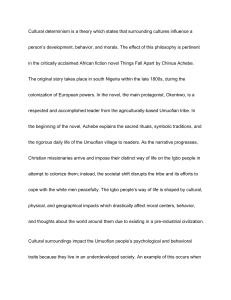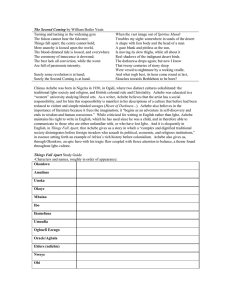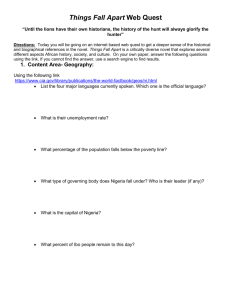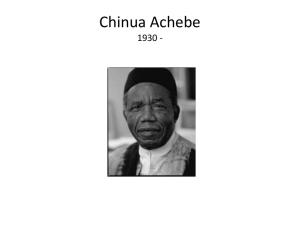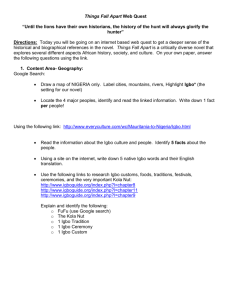Things Fall Apart.txt
advertisement
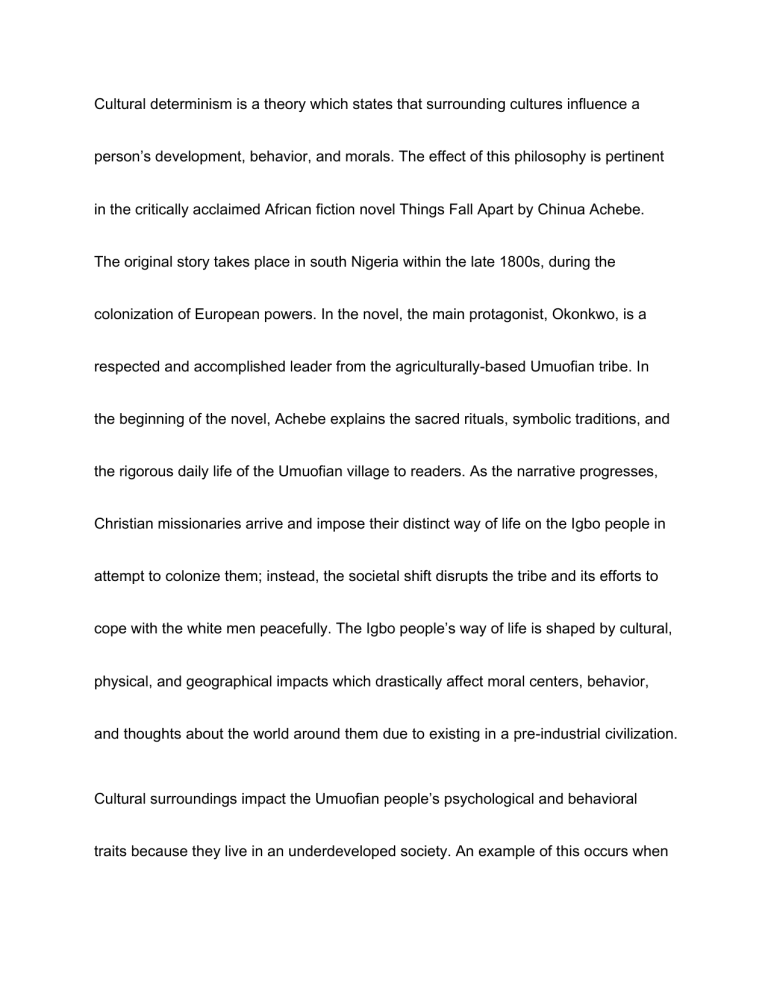
Cultural determinism is a theory which states that surrounding cultures influence a person’s development, behavior, and morals. The effect of this philosophy is pertinent in the critically acclaimed African fiction novel Things Fall Apart by Chinua Achebe. The original story takes place in south Nigeria within the late 1800s, during the colonization of European powers. In the novel, the main protagonist, Okonkwo, is a respected and accomplished leader from the agriculturally-based Umuofian tribe. In the beginning of the novel, Achebe explains the sacred rituals, symbolic traditions, and the rigorous daily life of the Umuofian village to readers. As the narrative progresses, Christian missionaries arrive and impose their distinct way of life on the Igbo people in attempt to colonize them; instead, the societal shift disrupts the tribe and its efforts to cope with the white men peacefully. The Igbo people’s way of life is shaped by cultural, physical, and geographical impacts which drastically affect moral centers, behavior, and thoughts about the world around them due to existing in a pre-industrial civilization. Cultural surroundings impact the Umuofian people’s psychological and behavioral traits because they live in an underdeveloped society. An example of this occurs when the village was gathered for a ceremony. “And then the egwugwu appeared. The women and children sent up a great shout and took to their heels. It was instinctive.” (Achebe 89). In the Igbo culture, fear plays a big role when higher beings and spirits are involved. This distinguishes the religion from more passive beliefs such as Christianity, Buddhism, and Judaism. The people of the Umuofian tribe are constantly trying to please the gods in fear of angering them. Another example of cultural influence is when Nwoye listens to some of the Christian poems “The hymn about brothers who sat in darkness and in fear seemed to answer a vague and persistent question that haunted his young soul – the question of the twins crying in the bush and the question of Ikemefuna who was killed. He felt a relief within as the hymn poured into his parched soul.” (Achebe 147). In contrast to the earlier quote, this quote describes how Christianity changed some of the Igbo people’s notions. In the passage, Nwoye connects deeply with the religion as it answers some of his most persistent questions and comforts his troubled mind. Although the belief seems like the way to go for Nwoye, he still fears what his father would think if he converted. Fear plays an important role in Umuofian beliefs because when angered, the gods wreak havoc on the village; in contrast, missionaries bring a new religion, Christianity, which allows the tribe to live more peacefully at the risk of losing their old ways. Along with cultural surroundings, physical surroundings can also greatly affect moral traits in a character. “The drums were still beating, persistent and unchanging. Their sound was no longer a separate thing from the living village. It was like the pulsation of its heart. It throbbed in the air, in the sunshine, and even in the trees, and filled the village with excitement.” (Achebe 44). The drums at the gathering create an ambiance that brings everyone together, therefore, it’s a great example of a physical surrounding. The drums make everyone and everything carefree and united as a tribe before major announcements. Achebe personifies the village in the quote to portray that the excitement is everywhere and inescapable to the reader. “‘It is iba,’ said Okonkwo as he took his machete and went into the bush to collect the leaves and grasses and barks of tree that went into making the medicine for iba.” (Achebe 76). Okonkwo makes good use of the physical environment around him to make remedies and medicine for people in need. Almost everything that the Umuofian people has comes locally, either from nearby markets or from the village itself. In this case, the medicine comes from local plants and this displays the knowledge the Igbo people have of the vegetation. The physical environment helps shape the tribe’s way of life as well as providing a bountiful array of resources for all living things. Lasrly, geographical surroundings can greatly impact one’s way of life. “His mother and sisters worked hard enough, but they grew women’s crops, like coco-yams, beans and cassava. Yam, the king of crops, was a man’s crop.” (Achebe ). In Western Africa, the yam was the king of crops due to all the labor-intensive work needed to cultivate and tend the fields. In the umuofian society, only men grew yams and the quantity of his harvest showed one's work ethic and power. “Every clan and village had its ‘evil forest.’ In it were buried all those who died of the really evil diseases, like leprosy and smallpox. It was also the dumping ground for the potent fetishes of great medicine men when they died. An “evil forest” was, therefore, alive with sinister forces and powers of darkness.” (Achebe 148). The geography around an early, agriculturally based civilization makes them think of the world differently. For example, a person living in the desert will regard trees and water highly, whereas one living in a forest has plenty of it therefore taking it for granted. The Igbo people have an evil forest in their clans to funnel and direct all the bad spirits away from the village and into the woods. The geographical surroundings of Western Africa clearly impact the Igbo people's behavior and beliefs about the world around them. Cultural, physical, and geographical settings play a big role in the shaping of a society's psychological and moral traits. In the novel Things Fall Apart by Chinua Achebe, the Umuofian tribe is almost dictated by their surroundings because they live in an underdeveloped civilization.
